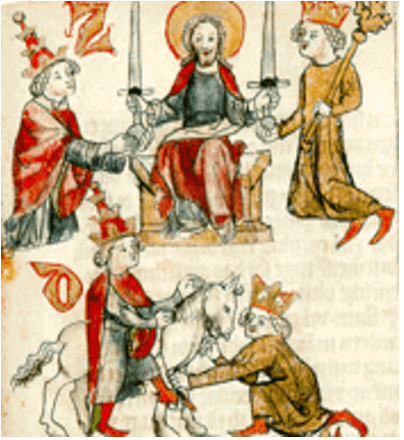Integralism is the political theory being advanced by some Catholics and even some Protestants that would put the national government under the authority of the church. Specifically, for Catholics, under the authority of the pope as it was before the Reformation.
I have been critical of this revival of Catholic political theory even though many Christian conservatives, disillusioned about liberal democracy, would love to see it put into place. Though how to do that in an increasingly secular society and an increasingly leftwing papacy is not clear.
Kevin Vallier’s All the Kingdoms of the World: On Radical Religious Alternatives to Liberalism offers a sympathetic critique of Integralism, along with similar anti-democratic, anti-freedom attempts at religious rule in Chinese Confucianism and Sunni Islam.
Terence Sweeney reviews Vallier’s book in his article for the liberal-leaning Catholic magazine Commonweal entitled Integralism’s False Promise: In search of a politics that enables the good. It brings out an aspect of Integralism–indeed, of at least some strains of Catholic ethics, which even some Protestants are flirting with–that is especially problematic: the notion that the state, using coercive power, can make its citizens good.
Here is Sweeney’s summary of the Integralist philosophy:
Integralists contend that liberalism’s internal contradictions are causing it to fail, and they seek to accelerate its decline while working for a new society freed from such contradictions. In this new “integral” society, people could live integrated lives ordered toward the right ends. Vallier argues that the integralist project depends on three claims: that the state exists to direct people to their natural good; that the Church is a polity ordering people to their supernatural good; and that the Church, therefore, ought to have indirect power over the state to direct people to their supernatural good. . . .
Catholic integralists such as the Harvard Law professor Adrian Vermeule and the Cistercian monk Edmund Waldstein argue for a society ordered toward the supernatural end of union with God. While the state should direct citizens toward natural virtues (something the liberal state refuses to do), the Church alone can foster supernatural virtues. Being good, integralists believe, requires both kinds of virtue. The two polities, Church and state, remain separate, but the Church directs the state where needed to promote the Catholic faith. This coordinated separation, Vallier writes, means that “the church has the right to rule the baptized, the state has the right to govern its citizens, and the church has the right to direct the state in a confined range of cases.”
The thing is, both the Integralists and its two critics, the liberal Catholic Sweeney and the politically liberal Vallier (whose religion I don’t know) agree that, in the words of Catholic Worker founder Peter Maurin, ““we must try to make that kind of a society in which it is easier for people to be good.”
The problem with Integralism, according to Vallier, is not its goal of making people better, but that it would not achieve that goal.
Having established the strengths of integralism, he proceeds to show how integralism actually makes it harder to be good. He does this in three ways. First, he demonstrates how the process of creating an integralist America would require unjust actions. The kind of administrative and judicial seizure of power that Vermeule and others promote might work, but would require dramatic actions of coercion to overcome the majority of Americans who would passionately oppose an integralist state. Second, if the integralists were to succeed, they would establish an unstable regime torn between the rival powers of Church and state, opposed by most Catholics and the hierarchy, and split between those who support the regime and the majority who do not. The use of force would be required not only to install such a regime but also to maintain it. Finally, Vallier argues, even if integralists could somehow take power and establish political stability, their regime would still be unjust. Integralism means that the state, guided by the Church, may compel the baptized to fulfill their religious obligations. For Vallier, this compulsion cannot be justified by baptism.
But the deeper problem is the very project of using state power to compel people to be “good.” Compelling the baptized to fulfill their religious obligations might create external compliance, but it cannot create faith. Forcing virtue makes it no longer a virtue. Morality has to do a person’s character, not external controls. In fact, the external controls prevent a person from being truly moral, since the imposition of power by the alliance of state and church that would make it impossible to do something wrong takes away agency, conscience, and freedom that are necessary in a virtuous human being.
The fact is, we are sinners no matter what the state does to us. Yes, the state must curb the worst external expressions of our sinfulness, otherwise any kind of society would be impossible. But the state cannot make us good.
That is the role of the church, but it can do so not by the exercise of power or control, but by the Gospel of Christ. The church’s tools are the Word and Sacraments, not governmental coercion. Integralism makes the reduces the church to a law-enforcer, effacing its true message of grace and forgiveness through the work of Christ.
I think of what Milton said in Areopagitica, that great defense of Christian liberty: “Though ye take from a covetous man all his treasure, he has yet one jewel left: ye cannot bereave him of his covetousness. Banish all objects of lust, shut up all youth into the severest discipline that can be exercised in any hermitage, ye cannot make them chaste that came not thither so.”
You can’t make a person virtuous by physically preventing him from doing anything bad. The sin remains on the inside. The remedy for that is the work of the Holy Spirit through faith in Christ.
This is why Luther and the other Reformers opposed the temporal authority claimed by the pope. It was a matter of the Gospel. This is why Lutherans have as one of their binding confessions in the Book of Concord the Treatise on the Power and Primacy of the Pope. Read that as a cure for Integralism.
Illustration: The Doctrine of the Two Swords [ideology of the Holy Roman Empire] by Eike von Repgow (1180-1235) – http://dca.lib.tufts.edu/features/law/books/, Public Domain, https://commons.wikimedia.org/w/index.php?curid=66454097














